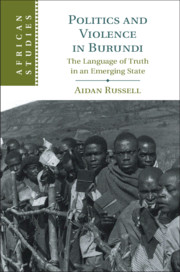Book contents
- Politics and Violence in Burundi
- African Studies Series
- Politics and Violence in Burundi
- Copyright page
- Contents
- Figures and Maps
- Acknowledgements
- Linguistic and Orthographic Note
- Glossary of Terms
- List of Abbreviations
- Introduction
- Prologue, 1796–1959
- Part I 1959–1961: ‘To See the Son of a King’
- 1 Ukuri ni kumwe
- 2 Ibigendajoro
- Part II 1961–1967: ‘A Most Total Anarchy’
- Part III 1968–1972: ‘Please Send Me a Car to Take Them Away’
- Conclusion
- Bibliography
- Index
- African Studies Series
2 - Ibigendajoro
Rebels in the Name of the King
from Part I - 1959–1961: ‘To See the Son of a King’
Published online by Cambridge University Press: 03 October 2019
- Politics and Violence in Burundi
- African Studies Series
- Politics and Violence in Burundi
- Copyright page
- Contents
- Figures and Maps
- Acknowledgements
- Linguistic and Orthographic Note
- Glossary of Terms
- List of Abbreviations
- Introduction
- Prologue, 1796–1959
- Part I 1959–1961: ‘To See the Son of a King’
- 1 Ukuri ni kumwe
- 2 Ibigendajoro
- Part II 1961–1967: ‘A Most Total Anarchy’
- Part III 1968–1972: ‘Please Send Me a Car to Take Them Away’
- Conclusion
- Bibliography
- Index
- African Studies Series
Summary
This chapter concentrates on individuals and their actions during the pre-independence electoral struggle. It narrates the move towards convincement in political opinions and the hardening of political blocs in the borderland, particularly in the opposition of nationalist propagandists and their local chief over the question of rightful authority. Nationalists countered the chief’s violent attitude towards dissent with stubbornness and the frank declaration of their political truth. After noting the shifts in political speech surrounding the tainted local elections in 1960, the chapter then examines a full-scale insurrection that followed, as nationalists in the borderland attacked their political opponents and rejected both colonial and chiefly authority. It observes the prevalence of the word ‘advice’ as a euphemism for political violence, and examines the rapid success and swift repression of the rebellion. It argues for a consideration of the conception of authority as given by the subject, and considers the ‘citizen-making’ violence of political dogma. It ends with a coda on the assassination of Prime Minister-elect Prince Rwagasore and the transition to independence.
- Type
- Chapter
- Information
- Politics and Violence in BurundiThe Language of Truth in an Emerging State, pp. 95 - 128Publisher: Cambridge University PressPrint publication year: 2019

